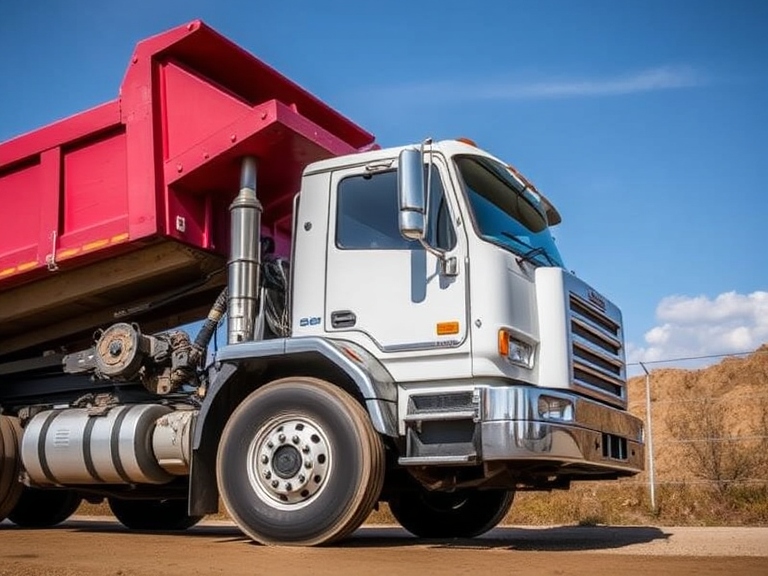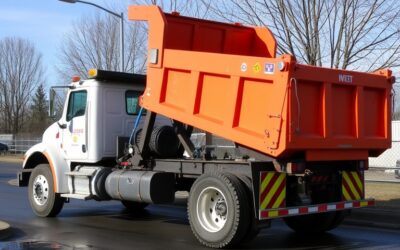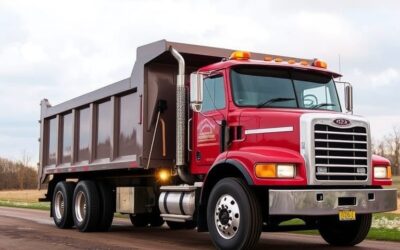Safe dump truck operations are the cornerstone of efficient business operations. With their heavy loads and uneven terrain, dump trucks face unique risks like tipping. By following proven practices—like proper loading, safe driving, and leveraging advanced technology—you can prevent accidents and keep your fleet running smoothly. These heavy-duty vehicles are essential for transporting large loads in industries like construction and waste management. However, their size and weight make them prone to tipping if not handled properly. Understanding and applying best practices can help prevent accidents and enhance the safety of both the driver and the truck.
In this article, we’ll explore these best practices in detail. From loading techniques to the importance of regular maintenance, we’ll provide actionable insights to help keep dump trucks stable and safe.
Proper Loading Techniques for Stability
Loading a dump truck correctly is the first step in ensuring safe operation. When a load is distributed unevenly, it can cause the truck to become unbalanced and increase the risk of tipping. Here are some best practices for loading:
Even Distribution: Spread the load evenly across the truck bed to prevent dangerous imbalances, especially on turns or uneven terrain. Make sure the load is centered to provide better stability. Uneven weight can cause the truck to lean to one side, especially when turning or driving on uneven surfaces.
Avoid Overloading: Stick to the truck’s weight limits. Overloading stresses the suspension and increases tipping risks. Overloading can create additional stress on the truck’s suspension and tires, making it more prone to tipping. Always check the truck’s weight limit before loading.
Low Center of Gravity: Place heavy items at the bottom and lighter ones on top to lower the center of gravity, reducing tipping risks on slopes and lighter items on top. This arrangement helps keep the truck stable, particularly on slopes or during sharp turns.
Securing the Load: Secure loose materials with ties, straps, or nets to prevent shifts during transit, ensuring the truck stays stable. This prevents the load from shifting during transport, which can destabilize the truck and lead to tipping.
Following these practices can greatly reduce the risk of tipping and make your dump truck operations much safer.
Safe Driving Practices for Dump Trucks
Driving a dump truck requires a different skill set compared to standard vehicles. Given their size and weight, dump trucks need careful handling to avoid accidents. Here are some key driving tips:
Slow and Steady: Drive at a steady, controlled speed. Slow down before corners or uneven terrain to maintain stability and on uneven terrain. High speeds can cause the truck to become unstable and increase the likelihood of tipping.
Smooth Maneuvers: Avoid abrupt stops and sharp turns to keep the load balanced and prevent tipping. These actions can shift the load and destabilize the truck. Always plan your route to minimize the need for abrupt movements.
Awareness of Surroundings: Stay aware of obstacles, terrain changes, and nearby vehicles to make safe, informed decisions. Be aware of obstacles, changes in terrain, and other vehicles. This awareness helps in making informed driving decisions and avoiding risky situations.
Stay Alert: Take regular breaks to stay alert. Fatigued drivers are more prone to errors that lead to accidents. Make sure to take regular breaks and avoid driving when tired. Staying alert and focused on the road is crucial for safe dump truck operation.
Proper Training: Train drivers on the unique handling of dump trucks, with regular refreshers to reinforce safety practices and understand the specific handling characteristics of dump trucks. Regular refresher courses can help maintain high safety standards.
By adhering to these driving practices, you can enhance the safety of dump truck operations and reduce the risk of accidents on the road.
Importance of Regular Maintenance and Inspections
Keeping dump trucks in good working condition is vital for safety and reliability. Regular maintenance and inspections help identify and fix issues before they become problems. Here are some key areas to focus on:
Tires and Brakes: Inspect tires for proper pressure and tread wear. Ensure brakes are in top condition to handle heavy loads. Worn-out tires can lead to poor grip and an increased risk of tipping. Similarly, ensure the brakes are in optimal condition to handle the heavy loads.
Hydraulic Systems: Check hydraulics for leaks and smooth operation, ensuring the bed raises and lowers safely and make sure they are functioning correctly. Faulty hydraulics can lead to difficulties in raising or lowering the truck bed, which can create dangerous situations.
Suspension and Steering: Inspect suspension and steering systems to maintain control on rough terrain and under heavy loads. These systems need to be in top shape to handle rough terrains and heavy loads without risking stability.
Electrical System: Test lights, alarms, and sensors regularly to maintain clear communication and timely alerts. Faulty electrical components can lead to failures in safety alerts and communication.
Routine Inspections: Schedule professional inspections to catch hidden issues before they compromise safety. A thorough check-up can identify issues that may not be apparent during day-to-day operations.
Utilizing Advanced Safety Technology
Advanced safety technology is transforming dump truck operations. From real-time load monitoring to Wink Anti-Tip’s tipping prevention systems, technology provides peace of mind and proactive protection. Using advanced safety systems helps minimize the risks and ensures smoother operations. Here’s how technology can assist:
Stability Control Systems: These systems monitor the truck’s stability and make automatic adjustments to prevent tipping. They provide real-time data and corrective actions that keep the truck balanced.
GPS Tracking: GPS tracking systems help monitor the truck’s route and position. They can also provide alerts for dangerous terrains or sudden changes in elevation.
Driver Assistance: Advanced driver-assistance systems (ADAS) offer features like lane departure warnings and collision avoidance. These systems help drivers stay alert and maintain control over the vehicle.
Load Monitoring: Technology can be used to monitor the weight and distribution of the load in real-time. This ensures that the load remains balanced and within safe limits during transit.
Alert Systems: Wink Anti-Tip’s advanced alert system provides real-time warnings when potential tipping is detected. This technology allows for immediate action, reducing the risk of accidents.
Conclusion
Stability and safety in dump truck operations rely on smart loading, cautious driving, routine maintenance, and cutting-edge tools like Wink Anti-Tip. By following these best practices, you can minimize risks, prevent tipping, and create a safer work environment for everyone involved.
Each of these components plays a crucial role in preventing accidents and maintaining efficient operations. By following these best practices, you can reduce the risk of tipping and other hazards, making the working environment safer for everyone involved.
For more information on how Wink Anti-Tip can help improve the safety and stability of your dump truck mixer operations, contact us today and discover the advantages of our advanced safety solutions. Your safety and efficiency are our top priorities.





